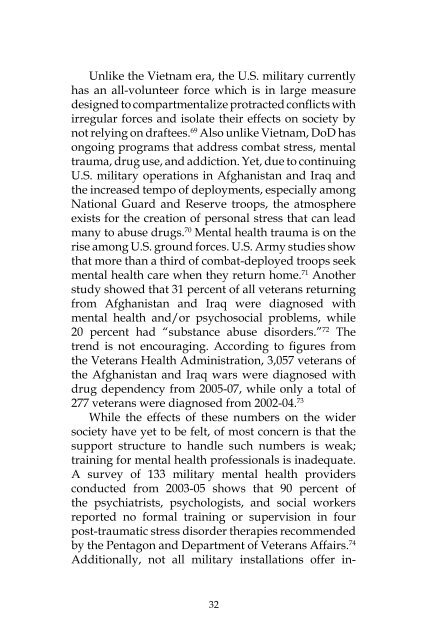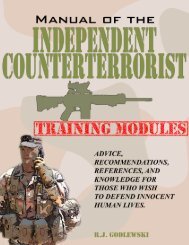R.J. Godlewski's The Independent Counterterrorist. I, Militia. June ...
R.J. Godlewski's The Independent Counterterrorist. I, Militia. June ...
R.J. Godlewski's The Independent Counterterrorist. I, Militia. June ...
- No tags were found...
Create successful ePaper yourself
Turn your PDF publications into a flip-book with our unique Google optimized e-Paper software.
Unlike the Vietnam era, the U.S. military currently<br />
has an all-volunteer force which is in large measure<br />
designed to compartmentalize protracted conflicts with<br />
irregular forces and isolate their effects on society by<br />
not relying on draftees. 69 Also unlike Vietnam, DoD has<br />
ongoing programs that address combat stress, mental<br />
trauma, drug use, and addiction. Yet, due to continuing<br />
U.S. military operations in Afghanistan and Iraq and<br />
the increased tempo of deployments, especially among<br />
National Guard and Reserve troops, the atmosphere<br />
exists for the creation of personal stress that can lead<br />
many to abuse drugs. 70 Mental health trauma is on the<br />
rise among U.S. ground forces. U.S. Army studies show<br />
that more than a third of combat-deployed troops seek<br />
mental health care when they return home. 71 Another<br />
study showed that 31 percent of all veterans returning<br />
from Afghanistan and Iraq were diagnosed with<br />
mental health and/or psychosocial problems, while<br />
20 percent had “substance abuse disorders.” 72 <strong>The</strong><br />
trend is not encouraging. According to figures from<br />
the Veterans Health Administration, 3,057 veterans of<br />
the Afghanistan and Iraq wars were diagnosed with<br />
drug dependency from 2005-07, while only a total of<br />
277 veterans were diagnosed from 2002-04. 73<br />
While the effects of these numbers on the wider<br />
society have yet to be felt, of most concern is that the<br />
support structure to handle such numbers is weak;<br />
training for mental health professionals is inadequate.<br />
A survey of 133 military mental health providers<br />
conducted from 2003-05 shows that 90 percent of<br />
the psychiatrists, psychologists, and social workers<br />
reported no formal training or supervision in four<br />
post-traumatic stress disorder therapies recommended<br />
by the Pentagon and Department of Veterans Affairs. 74<br />
Additionally, not all military installations offer in-<br />
32







